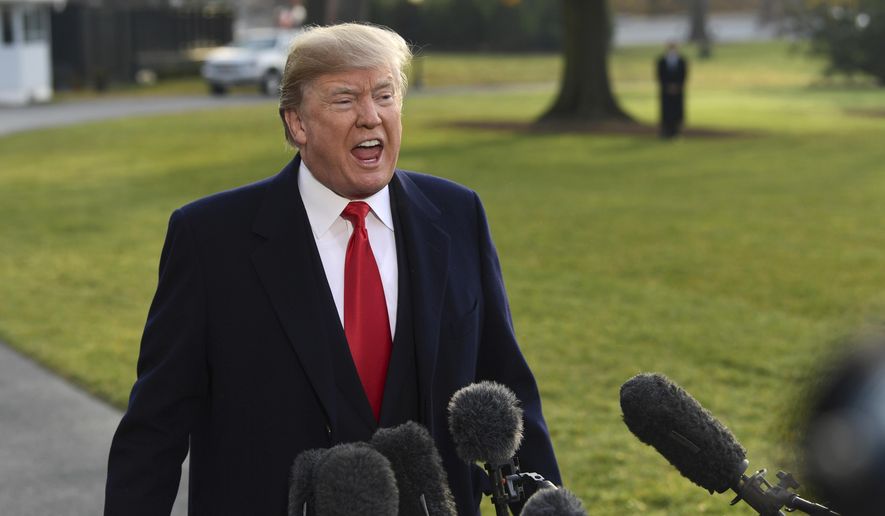WASHINGTON (AP) - The shifting explanations for why President Donald Trump fired national security adviser Michael Flynn have revived questions about whether the president may have obstructed an ongoing investigation of potential contacts between his campaign and Russia.
Pressure on the administration has mounted since Flynn last week pleaded guilty to lying to the FBI about his conversations with the Russian ambassador, with prosecutors revealing that he is now cooperating with special counsel Robert Mueller’s investigation. And a muddled White House response, including a problematic presidential tweet, has left some Trump confidants worried that the president is not being well-served by his legal team and believing his lawyers have painted a too-rosy picture of the president’s potential plight.
The president’s aides and legal advisers have scrambled for 48 hours to explain a presidential tweet that raised the specter of obstruction. It read: “I had to fire General Flynn because he lied to the Vice President and the FBI. He has pleaded guilty to those lies. It is a shame because his actions during the transition were lawful. There was nothing to hide!”
That tweet appeared to indicate a change in the White House explanation for Flynn’s firing, suggesting Trump was aware when the White House dismissed Flynn on Feb. 13 that the national security adviser had lied to the FBI, whose agents had interviewed him weeks earlier. Former FBI Director James Comey has said Trump the following day brought up the Flynn investigation in private at the White House and told him he hoped he could “let this go,” raising the possibility he knew Flynn had lied and was looking to cover up the offense.
With questions raised by the tweet, Trump associates tried to put distance between the president and the potentially incriminating message.
One of Trump’s attorneys, John Dowd, told CNN on Sunday that he was responsible for crafting the tweet.
Dowd declined to comment to the AP but replied with a Fox News story Monday quoting prominent lawyer Alan Dershowitz as saying Trump couldn’t have committed obstruction of justice by urging Comey to drop the FBI investigation of Flynn.
Kellyanne Conway, counselor to the president, backed up Dowd’s claim that he wrote the tweet, saying “the lawyers are the ones that understand how to put those tweets together.”
“I was with the president on Saturday all day, frankly, and I know that what he said is correct,” Conway continued, referring to Dowd. “What he says is that he put it together and sent it to our director of social media.”
A White House spokesman declined to answer whether Dowd dictated the tweet word-for-word to the White House director of social media, Dan Scavino, or whether Scavino, who has access to the @RealDonaldTrump account and its 44 million followers, put the sentiment into something resembling Trump’s own voice.
The president angrily scolded aides for the tweet over the weekend, according to a person familiar with private conversations but not authorized to discuss them publicly. The White House is considering reviewing how some tweets, particularly related to the Russia probe, get posted.
The episode has rattled some of Trump’s outside advisers, who have pressed upon Trump since Flynn’s guilty plea that he needs to change legal strategy. White House lawyer Ty Cobb has repeatedly offered public assurances that the investigation into the administration would soon be over, with the president exonerated.
Trump has taken that counsel to heart, telling two close allies over the weekend that he believed he was in the clear and that Mueller’s team wouldn’t unveil any further charges, according to the advisers who discussed the private conversations under the conditions of anonymity. Both of the confidants said they disputed that assessment and urged Trump to go on the offensive, perhaps by firing his current lawyers or triggering a series of events that could lead to Mueller’s dismissal.
Trump did not suggest he was considering that approach. And one of the advisers, who speaks to Trump regularly, said the president had not discussed with him the possibility of issuing any pardons.
The president did lob new criticism at the special counsel investigation Monday, saying he feels “very badly” for Flynn.
“I think it’s a shame,” Trump said of Flynn’s situation, adding that it’s “very unfair” and that Flynn had “led a very strong life.”
In the wake of the controversial tweet, Trump launched a fresh denial that he had pressured the former FBI director, tweeting Sunday that “I never asked Comey to stop investigating Flynn. Just more Fake News covering another Comey lie!”
Trump fired Comey in May, leading to Mueller’s appointment.
Any proof that Trump knew before he spoke with Comey in February that Flynn had lied to the FBI could bolster obstruction of justice allegations against the president and raise the prospect that he was trying to protect a key member of his inner circle from probable prosecution, said Jimmy Gurule, a Notre Dame criminal law professor and former federal prosecutor.
Though the president has previously said he was thinking of “this Russia thing” when he fired Comey, Gurule said it was reasonable to infer from the weekend tweet that the dismissal of Comey was done in the hope of terminating the FBI investigation.
“If you have knowledge of a crime, a reasonable person would disclose that information to law enforcement. The president did not,” Gurule said.
But David Rivkin Jr., a Washington lawyer specializing in constitutional law who worked in the Justice Department under presidents Ronald Reagan and George H.W. Bush, said that even if the president knew that Flynn had lied to the FBI, “his authority as the chief executive is perfectly sufficient and appropriate to decide that this matter should not be investigated any further.”
___
Lemire reported from New York.
___
Follow Lemire on Twitter at http://twitter.com/@JonLemire and Tucker at http://twitter.com/@etuckerAP




Please read our comment policy before commenting.